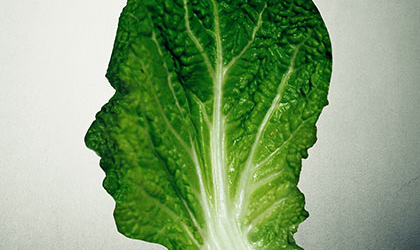
It’s no secret that we’re all living longer. And while our bodies may continue to feel 40-something in old age, our minds can struggle to keep pace. Perhaps you can’t recall a familiar name in a conversation, where you parked the car, or the date of your nephew’s birthday – whatever gets your goat, those ‘senior moments’ can be frustrating. Thankfully, there’s a smorgasbord of hacks to keep your grey matter healthy and happy well into old age. Here are some powerful weapons to stash in your brainbox.
Massage your memory
The more you consciously try to memorise actions and activities, the easier you can master this cognitive function. Start your day with a crossword puzzles or Sudoku, take music lessons, learn a new language, or play chess. If this doesn’t appeal to your tastes, then you can just do more to exercise your memory. For instance, make a conscious effort to learn your ‘to-do’ or grocery lists. Try to engage all your senses when involving your memory, too. Your brain will retain much more information if all the senses are included in the process of learning something new. Give ceramics a go; notice the smell and feel of the materials used.
Step it up
Physical activity is brilliant mental floss, too. Working out helps both your cognition directly and indirectly. Directly, it supports the reduction of inflammation and insulin resistance, as well as stimulates the production of growth factors – chemicals that assist with the overall maintenance of brain cellsi. Indirectly, exercise enhances sleep quality and emotional wellbeing, thereby reducing anxiety and stress – areas that often play a key role in cognitive impairment. Another reason to switch off Netflix and get off the couch, right?
To reap the brain-boosting benefits, aim for a half an hour of moderate exercise most days of the week. If that sounds intimidating, jumpstart your efforts with a few minutes a day and then gradually build up your stamina. Aim for something that gets your heart pumping: walking, stair climbing, squash, dancing, or tennis. Heck, even household chores make you break a light sweat!
Restore with rest
Besides waking up alert, energised and ready to take on the day, clocking a perfect eight hours of sleep supports your brain’s ability to consolidate events into memories. A study from the University of California, San Francisco discovered a link between poor sleep quality and reduced function in the brain’s frontal lobe, which assists with memory and processing informationii. Napping is thought to help, too (how’s that for great news?). A Harvard University study found that participants who were trained on task and then took a short nap performed much better on memory assessments than their non-napping counterpartsiii. Struggling to clock off? Discover our tried-and-tested ways to send you into dreamland.
Take it easy on the tipples
Okay, we all enjoy unwinding with a glass of vino now and then, but excessive drinking can take its toll on your smarts later in life. A recent study discovered that middle-aged men who consumed more than two and a half drinks per day experienced cognitive problems and memory loss up to six years sooner than those who drink alcohol moderatelyiv. So, do your grey matter a favour: go easy on the booze. Top tip: use smaller glasses for your tipples so you aren’t tempted to drink the entire bottle of wine in one sitting.
Be mindful
If you’ve done any snooping around the health and wellness corner of the Internet, you’ll notice the buzzword ‘mindfulness’ makes an appearance once or twice. Alongside supporting anxiety, low mood and addiction, a growing raft of scientific research suggests this oh-so-zenful practice can improve your memory, too. One investigation found students at The University of California, Santa Barbara improved their focus and memory after meditating for 45 minutes, four times per week, for just two weeksv. The participants implemented mindfulness techniques like deep breathing, counting exercises and listening to relaxing sounds. Best off all? You can start being mindful right now – this minute, this second. Your smart will thank you for it.
Switch up your routine
Routine is comforting and familiar. We all like it. But, sadly, we can take routine too far at times. It turns out having the same lunch five-days a week, driving the same route to work, or doing the same workouts in the gym isn’t good for our noggins. So we urge you to break with the humdrum. New experiences can help your brain retain and recall information. When you’re in a novel scenario, your noggin assumes the information is crucial and holds on to it. So what are you waiting for? Try an open sandwich for lunch instead of your usual salad or sign up to an aerobics class over simply plonking yourself on the exercise bike as per usual.
Jump for java
Coffee lovers, rejoice: you can now have your cuppa Joe and drink it, all in the name of supporting your smarts. Beyond busting those bleary eyes in the morning, experts believe caffeine can improve your memory. Scientists at Johns Hopkins University propose the java can enhance your ability to retain information and recall. Participants who consumed the equivalent of 1-2 cups of brewed coffee, performed much better in memory tests than those who were given the placebovi. Time for a refill?
Recall with rosemary
When we think of aromatherapy, we often think of relaxation, massage, and essential oil diffusers. But memory – really? Well, according to new research conducted by Northumbria University exposure to rosemary essential oil is thought to boost your recallvii. Experts discovered that students working in a room with diffused rosemary essential oil attained between 5-7% better results in memory tests than the control group. A herb to season your roasties and your recall. How marvellous.
Noggin nutrition
To rev up your memory, you need to fuel it with an array of colourful, nourishing foods. While there’s a slew brain-boosting foods we could mention here, there are three superstars really worth heralding. Firstly, let’s talk turmeric. The active compound in this gorgeously golden spice, curcumin, supports cognition in myriad ways. According to stacks of scientific research, curcumin combats degenerative functions in the brain, as well as supporting mood and, crucially, memoryviii. For optimal absorption, always eat turmeric with a healthy fat source. Indian food fans, you have our permission to go back for a second helping! Discover more about how to incorporate iurmeric into your diet.
Now onto brain-boosting omega-3 fatty acids, found in abundance in oily fish. These compounds have shown immense promise in supporting all aspects of cognitive function, including memoryix. To reap the noggin-loving benefits, aim to eat 2-3 portions of oily fish each week. Pro cooking tip: salmon packs the highest amount of omega-3 fatty acids, so be sure to add this seafood sensation your diet. Not a salmon fan? No problem. Anchovies, mackerel, and herring also serve up a delicious amount of omega-3.
Finally, we need to big up berries. Packed with powerful antioxidants called anthocyanidins, these jewelled beauties work wonders for the ageing brain, especially where memory is concerned. In 2012, scientists at Brigham and Women’s Hospital discovered older women who consumed large amounts of antioxidant-rich berries delayed their memory deterioration by more than two years compared to their non-berry eating counterpartsx. Cramming more berries into your diet is pretty simple: sprinkle them on porridge, add a handful to smoothies, or munch on them straight from the punnet. Don’t forget frozen berries count, too. Learn more about the powerful properties of anthocyanidins here.
References:
-
Heisz, J., Clark, I., Bonin, K., Paolucci, E., Michalskio, B., Becker, M. (2017). The Effects of Physical Exercise and Cognitive Training on Memory and Neurotrophic Factors. Journal of Cognitive Neuroscience, 29(11), 1895-1907.
-
Sanders, R. (2018). New evidence that chronic stress predisposes brain to mental illness. Berkeley News, Available online: https://news.berkeley.edu/2014/02/11/chronic-stress-predisposes-brain-to-mental-illness [Accessed 7 Dec. 2018].
-
American Academy of Sleep Medicine – Association for Sleep Clinicians and Researchers. (2018). Journal SLEEP: Study Concludes a Daytime Nap Can Benefit a Person’s Memory Performance - American Academy of Sleep Medicine – Association for Sleep Clinicians and Researchers. Available online: https://aasm.org/journal-sleep-study-concludes-a-daytime-nap-can-benefit-a-persons-memory-performance [Accessed 5 Dec. 2018].
-
Kabai, P., Sabia, S. & Singh-Manoux, A. (2014). Alcohol consumption and cognitive decline in early old age. Neurology, 83(5), 476-476.
-
Hamblin, J. (2018). Study: Meditation Improves Memory, Attention. The Atlantic. Available online: https://www.theatlantic.com/health/archive/2013/05/study-meditation-improves-memory-attention/275564 [Accessed 5 Dec. 2018]
-
The Hub. (2018). Caffeine has positive effect on memory, Johns Hopkins researchers say. Available online: https://hub.jhu.edu/2014/01/12/caffeine-enhances-memory [Accessed 5 Dec. 2018].
-
(2018). Herbs that can boost your mood and memory. Northumbria.ac.uk. Available online: https://www.northumbria.ac.uk/about-us/news-events/news/2016/04/herbs-that-can-boost-your-mood-and-memory [Accessed 5 Dec. 2018].
-
Hopper, L. (2018). Curcumin improves memory and mood, new UCLA study says. UCLA Newsroom. Available online: http://newsroom.ucla.edu/releases/curcumin-improves-memory-and-mood-new-ucla-study-says [Accessed 5 Dec. 2018]
-
(2008) Brain foods: the effects of nutrients on brain function. Nature reviews, Neuroscience, 9(7), 568-78
-
EurekAlert!. (2018). Berries keep your brain sharp. Available online: https://www.eurekalert.org/pub_releases/2012-04/bawh-bky042512.php [Accessed 6 Dec. 2018].
You Might Also Like

Olivia
Olivia Salter has always been an avid health nut. After graduating from the University of Bristol, she began working for a nutritional consultancy where she discovered her passion for all things wellness-related. There, she executed much of the company’s content marketing strategy and found her niche in health writing, publishing articles in Women’s Health, Mind Body Green, Thrive and Psychologies.
View More



